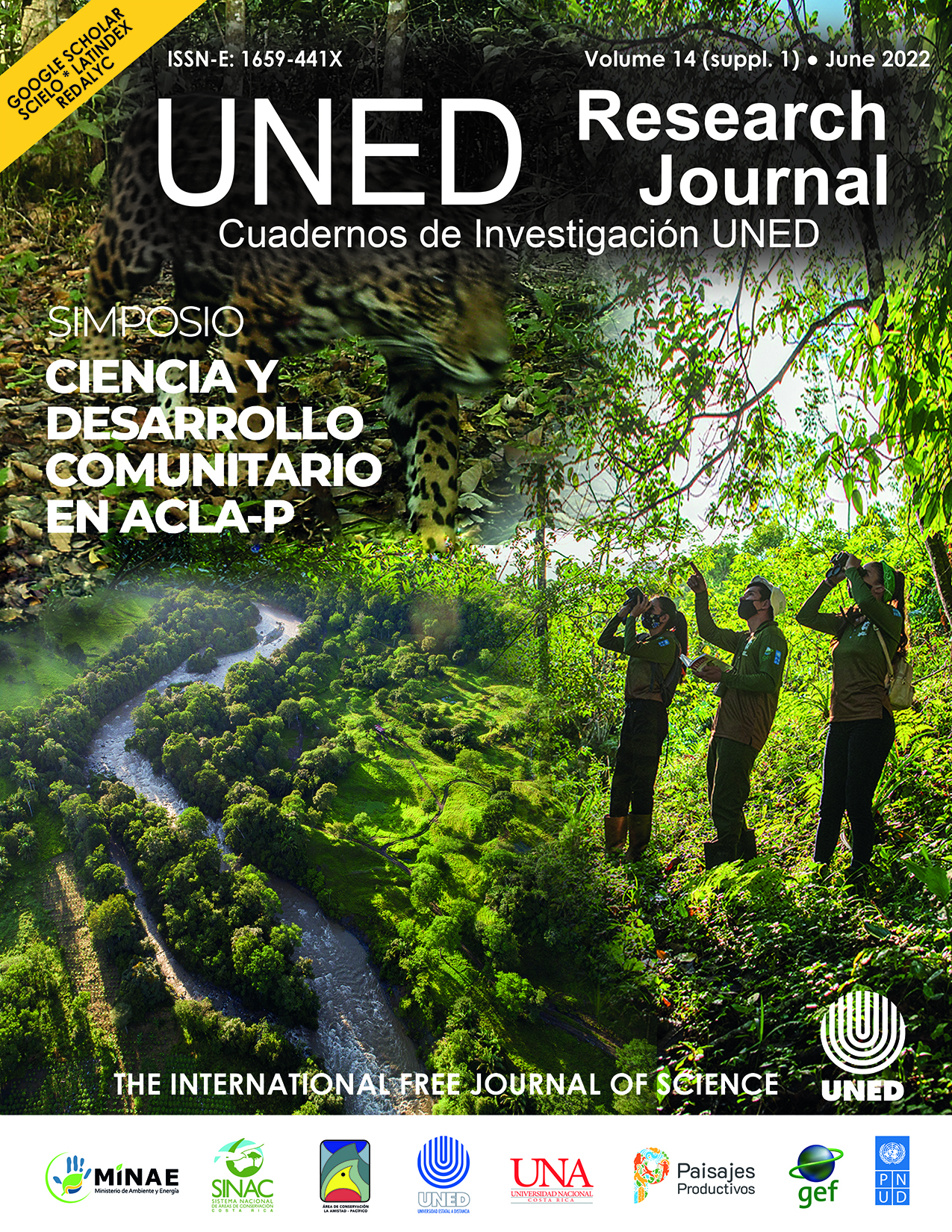Research in community plant nurseries at biological corridors in La Amistad-Pacífico Conservation Area, Costa Rica
DOI:
https://doi.org/10.22458/urj.v14iS1.3859Keywords:
amistosa, biological corridor, fila languciana, fuente de vida, reforestationAbstract
Introduction: La Amistad-Pacífico Conservation Area has includes three biological corridors that can benefit from native tree nurseries for reforestation and landscape permeabilization. Objective: To test a network of cost-effective community nurseries supported by local stakeholders to ensure long-term viability and evidence-based restoration. Methods: We stablished a reference nursery (>10 000 seedlings) and four small-scale ones (between 163 and 1 600 seedlings). We collected seedlings of 40 tree species between October 2020 and June 2021 and nursed them at an appropriate elevation, estimating survival for species with n ≥ 10. Results: The mean survival was 82%, with 16 species having a survival ≥ 80%. Seedlings with cotyledons did better. Reasons to establish nurseries include attraction of bees, aesthetics, shade, timber, food for wildlife and reforestation. Conclusion: These small-scale nurseries are viable and help communities to stay motivated and to estimate species survival.
References
Cedeño-Fonseca M, Grayum, M. H., Croat, T. B., & Blanco, M. A. (2020a). Three new species of Monstera (Araceae: Monsteroideae: Monstereae) from the Cordillera de Talamanca in Costa Rica, threatened by the expansion of coffee plantations. Nordic Journal of Botany 38(12), 1–13. https://doi.org/10.1111/njb.02970
Cedeño-Fonseca, M., Flores-Leitón, J., Quesada-Roman, A., & Flores, R. (2020b). Inventario florístico en un bosque amenazado por la expansión agrícola en la reserva del Centro Turístico Los Chocuacos, Costa Rica. Revista de Ciencias Ambientales, 54(1), 33-57. https://doi.org/10.15359/rca.54-1.3
Cedeño-Fonseca, M., Ortiz, O. O., Seisdedos-de-Vergara, R., & Porras, J. (2021). Nuevas Aráceas para Costa Rica, recolectadas en el Corredor Biológico Fuente de Vida la Amistad. Phytoneuron, 43, 1-8.
Newton, A.C., & Tejedor, N. (Eds.). (2011). Principios y práctica de la restauración del paisaje forestal: Estudios de caso en las zonas secas de América Latina. Unión Internacional para la Conservación de la Naturaleza y los Recursos Naturales (UICN).
Ortiz, O. O., Cedeño-Fonseca, M. V., Jiménez, J. E., Hidalgo-Mora, J. E., López-Mora, M., & Baldini R., M. (2021). Novelties in Costa Rica aroids (Araceae) with nomenclatural notes. Acta Botanica Mexicana, (128), e1750. https://doi.org/10.21829/abm128.2021.1750
Rojas, L., & Chavarría, M. (2005). Corredores Biológicos de Costa Rica. Editorial San José, MINAE/SINAC.
Sistema Nacional de Áreas de Conservación (SINAC). (2018). Corredor Biológico Amistosa: Plan de Gestión 2018‒2027. H. Acevedo (Ed.). La Gamba. https://bit.ly/3qW2rb9
Published
How to Cite
Issue
Section
License
Copyright (c) 2021 UNED Research Journal

This work is licensed under a Creative Commons Attribution 4.0 International License.
Note: This abstract contains an incorrect copyright due to technical issues. Authors who publish with this journal agree to the following terms: Authors retain copyright and grant the journal right of first publication with the work simultaneously licensed under a Creative Commons Attribution License that allows others to share the work with an acknowledgement of the work's authorship and initial publication in this journal
All journal contents are freely available through a CC BY 4.0 license.
CC BY 4.0 is a Creative Commons: you can copy, modify, distribute, and perform, even for commercial reasons, without asking permission, if you give appropriate credit.
Contents can be reproduced if the source and copyright are acknowledged according to the Open Access license CC BY 4.0. Self-storage in preprint servers and repositories is allowed for all versions. We encourage authors to publish raw data and data logs in public repositories and to include the links with all drafts so that reviewers and readers can consult them at any time.
The journal is financed by public funds via Universidad Estatal a Distancia and editorial independence and ethical compliance are guaranteed by the Board of Editors, UNED. We do not publish paid ads or receive funds from companies.
